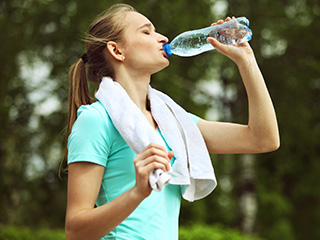Keep Hydrated, Stay Safe

By: George Cavanagh, M.D.
Summer is here. Time for picnics, sports, working in the yard ─ and the risk of dehydration.
Our bodies normally lose fluids in the form of exhaled water vapor, in sweat, and in urine and stool. Along with water, small amounts of salts are also lost. However, we become dehydrated when we lose more water than we take in, and our bodies don’t have enough water to carry out normal functions.
Dehydration often occurs in hot weather during outdoor work or exercise, but it can also be caused by illnesses such as diarrhea, vomiting or fever. Anyone may become dehydrated, but young children, older adults and people with chronic illnesses are most at risk. In severe cases, dehydration can lead to death.
The signs of mild to moderate dehydration include:
- Increased thirst
- Dry mouth and swollen tongue
- Weakness
- Sluggishness
- Decreased urine output. (Urine color may indicate dehydration. If it is deeply yellow or amber, you may be dehydrated.)
If you’re a healthy adult, you can usually treat mild to moderate dehydration by drinking more fluids, including water, sports drinks, or oral rehydration solutions. However, if you develop any of these severe symptoms, you should seek medical attention immediately:
- Extreme thirst
- Lack of urination
- Shriveled skin (that doesn’t bounce back when pinched)
- Dizziness
- Confusion
- Fainting
- Heart palpitations (the feeling that your heart is pounding or jumping)
The best approach is to prevent dehydration in the first place. If you are caring for people who are sick, make sure they get plenty of fluids if they have diarrhea, vomiting or fever.
If you need to be outside in the heat, follow these steps to keep hydrated:
- Take plenty of fluids and drink continuously to replace what you lose
- Avoid exercise and exposure during the hottest part of the day, typically mid-afternoon
- Wear a hat and light-colored and loose-fitting clothing
- Carry a personal fan or mister to cool yourself
- Break up your exposure to hot temperatures and direct sun. Find air-conditioned or shady areas and allow yourself to cool between exposures
- Avoid alcohol consumption because alcohol increases water loss
Remember, the key to preventing dehydration is to replace the water you lose, so drink up!

Dr. George Cavanagh is an MPCP partner and practices in our Bowie office. He is certified by the American Board of Family Medicine.
Recommended Posts
Surprising Health Benefits of Cold Weather
By John Billon, M.D.
Respiratory Illnesses: Nothing To Sneeze At
By Sneha Sheth, M.D.
Bless You!
By Janice Rutkowski, M.D.





